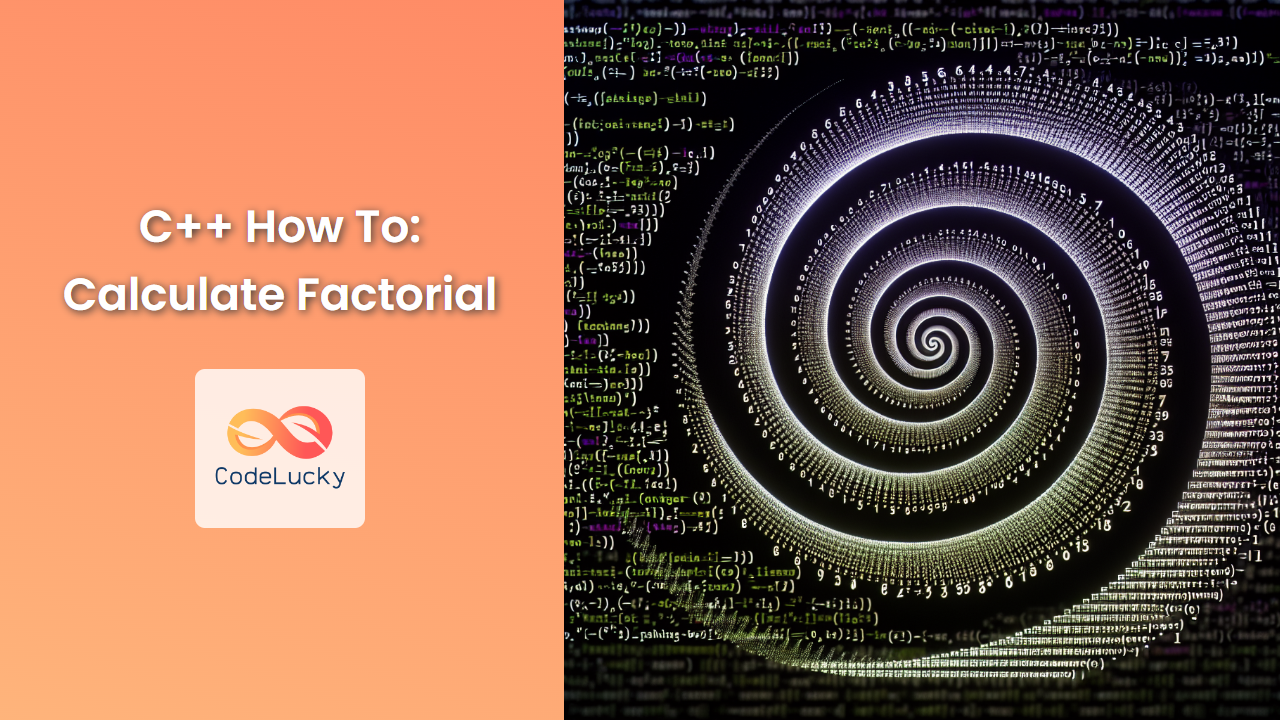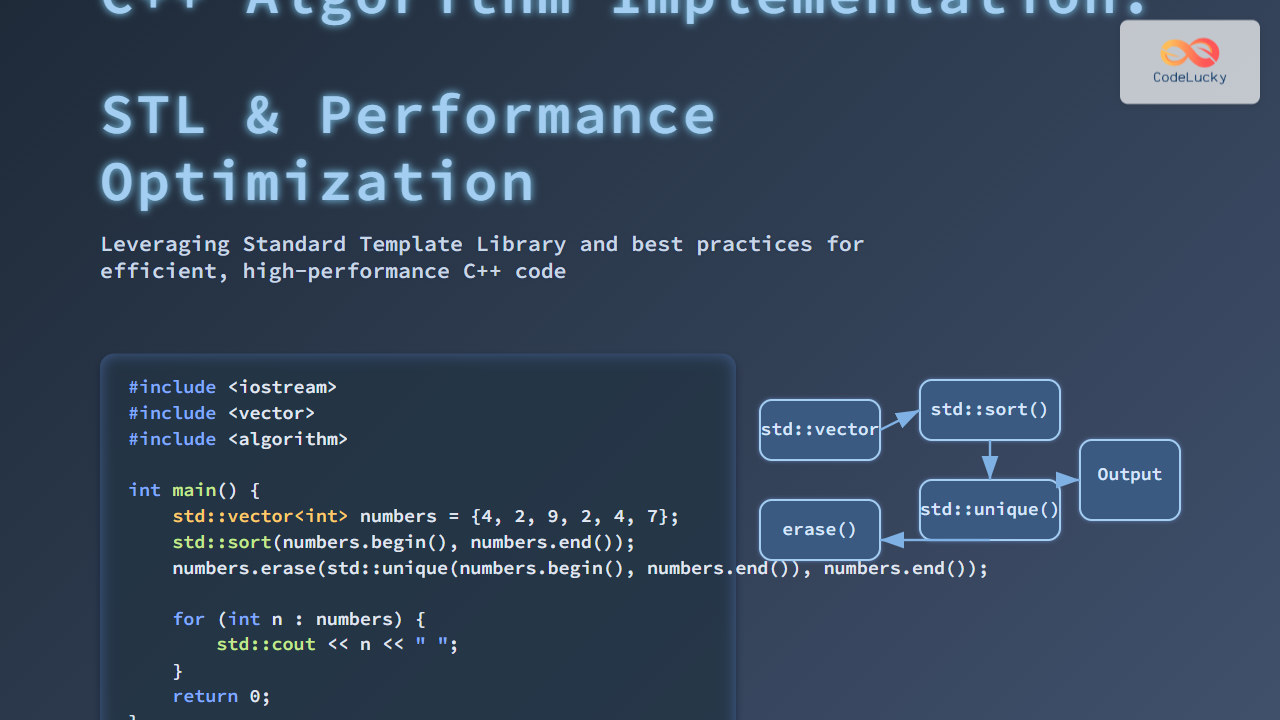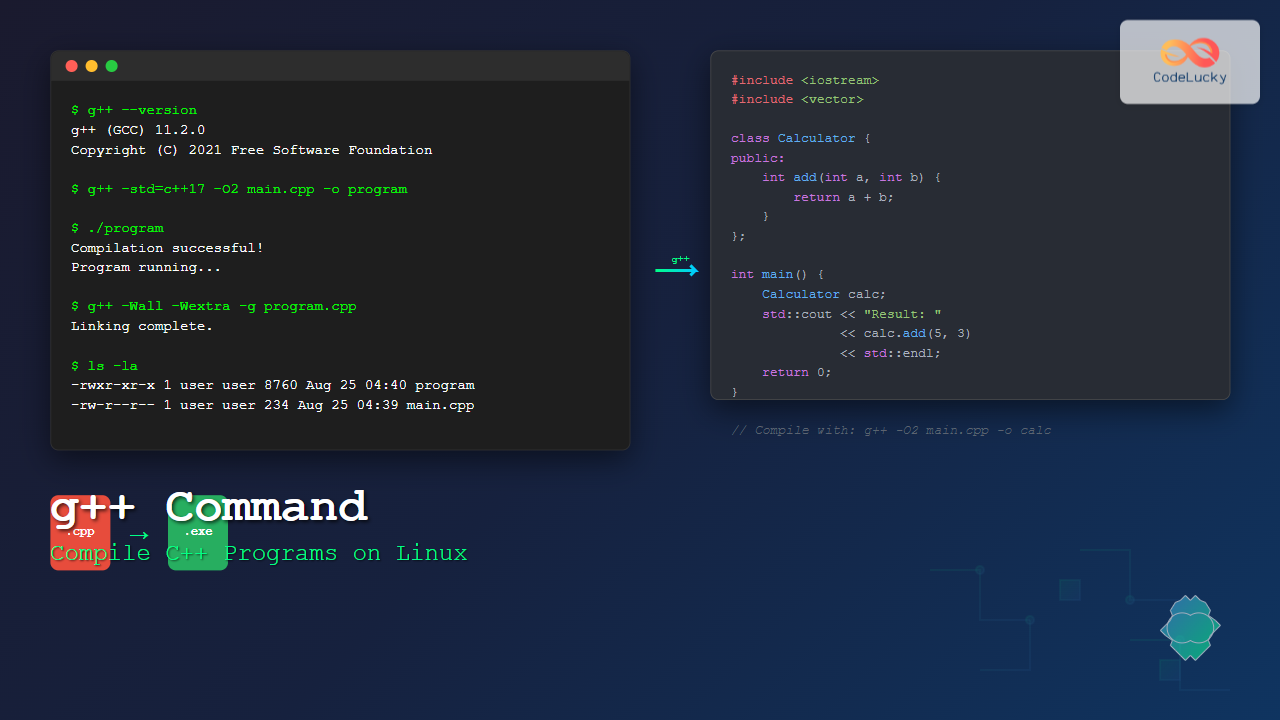In the world of mathematics and programming, the factorial of a non-negative integer is a fundamental concept. It's denoted by an exclamation mark (!) and is the product of all positive integers less than or equal to that number. For instance, 5! = 5 × 4 × 3 × 2 × 1 = 120. In this comprehensive guide, we'll explore various C++ methods to calculate factorials, from simple iterative approaches to more advanced recursive techniques.
Understanding Factorial
Before we dive into the C++ implementations, let's briefly recap what a factorial is:
- The factorial of 0 is defined as 1 (0! = 1)
- For any positive integer n, n! = n × (n-1) × (n-2) × … × 2 × 1
- Factorial is undefined for negative numbers
🧮 Fun Fact: The concept of factorial was introduced by Christian Kramp in 1808.
Now, let's explore different C++ approaches to calculate factorials.
Method 1: Iterative Approach
The simplest way to calculate a factorial is using a loop. This method is straightforward and efficient for small to medium-sized numbers.
#include <iostream>
unsigned long long calculateFactorial(int n) {
if (n < 0) {
throw std::invalid_argument("Factorial is not defined for negative numbers");
}
unsigned long long result = 1;
for (int i = 2; i <= n; ++i) {
result *= i;
}
return result;
}
int main() {
int number;
std::cout << "Enter a non-negative integer: ";
std::cin >> number;
try {
unsigned long long factorial = calculateFactorial(number);
std::cout << number << "! = " << factorial << std::endl;
} catch (const std::invalid_argument& e) {
std::cerr << "Error: " << e.what() << std::endl;
}
return 0;
}
In this example:
- We define a function
calculateFactorialthat takes an integernas input. - We use an
unsigned long longto store the result, allowing for larger factorials. - The function checks if the input is negative and throws an exception if it is.
- We initialize
resultto 1 (covering the case of 0! and starting point for other calculations). - The loop multiplies
resultby each number from 2 to n. - In the
mainfunction, we handle potential exceptions for invalid inputs.
Let's look at some sample inputs and outputs:
| Input | Output |
|---|---|
| 0 | 0! = 1 |
| 5 | 5! = 120 |
| 10 | 10! = 3628800 |
| -3 | Error: Factorial is not defined for negative numbers |
🔍 Note: This method works well for factorials up to 20!. Beyond that, you might encounter overflow issues with unsigned long long.
Method 2: Recursive Approach
Recursion offers an elegant way to calculate factorials. It's particularly useful for understanding the concept, though it may not be as efficient for large numbers due to stack overflow risks.
#include <iostream>
unsigned long long recursiveFactorial(int n) {
if (n < 0) {
throw std::invalid_argument("Factorial is not defined for negative numbers");
}
if (n == 0 || n == 1) {
return 1;
}
return n * recursiveFactorial(n - 1);
}
int main() {
int number;
std::cout << "Enter a non-negative integer: ";
std::cin >> number;
try {
unsigned long long factorial = recursiveFactorial(number);
std::cout << number << "! = " << factorial << std::endl;
} catch (const std::invalid_argument& e) {
std::cerr << "Error: " << e.what() << std::endl;
}
return 0;
}
This recursive approach:
- Defines a base case: if n is 0 or 1, return 1.
- For any other positive n, it returns n multiplied by the factorial of (n-1).
- It also includes a check for negative numbers, throwing an exception if encountered.
Sample inputs and outputs remain the same as the iterative approach:
| Input | Output |
|---|---|
| 0 | 0! = 1 |
| 5 | 5! = 120 |
| 10 | 10! = 3628800 |
| -3 | Error: Factorial is not defined for negative numbers |
⚠️ Caution: While elegant, recursive solutions can lead to stack overflow for large inputs. Most C++ compilers can handle factorials up to about 12! or 13! using this method before encountering issues.
Method 3: Memoization Approach
Memoization is an optimization technique where we store the results of expensive function calls and return the cached result when the same inputs occur again. This can significantly improve performance for repeated calculations.
#include <iostream>
#include <vector>
class FactorialCalculator {
private:
std::vector<unsigned long long> memo;
public:
FactorialCalculator(int maxN) : memo(maxN + 1, 0) {
memo[0] = 1;
memo[1] = 1;
}
unsigned long long calculate(int n) {
if (n < 0) {
throw std::invalid_argument("Factorial is not defined for negative numbers");
}
if (n >= memo.size()) {
throw std::out_of_range("Input exceeds maximum supported value");
}
if (memo[n] != 0) {
return memo[n];
}
memo[n] = n * calculate(n - 1);
return memo[n];
}
};
int main() {
const int MAX_N = 20; // Maximum supported factorial
FactorialCalculator calculator(MAX_N);
std::vector<int> testCases = {0, 5, 10, 15, 20};
for (int n : testCases) {
try {
unsigned long long result = calculator.calculate(n);
std::cout << n << "! = " << result << std::endl;
} catch (const std::exception& e) {
std::cerr << "Error for " << n << ": " << e.what() << std::endl;
}
}
return 0;
}
This memoization approach:
- Uses a
FactorialCalculatorclass to encapsulate the memoization logic. - Initializes a vector
memoto store calculated factorials. - Implements a
calculatemethod that checks the memo before performing calculations. - Throws exceptions for negative numbers and inputs exceeding the maximum supported value.
Let's look at the output for our test cases:
| Input | Output |
|---|---|
| 0 | 0! = 1 |
| 5 | 5! = 120 |
| 10 | 10! = 3628800 |
| 15 | 15! = 1307674368000 |
| 20 | 20! = 2432902008176640000 |
🚀 Performance Boost: Memoization shines when you need to calculate factorials repeatedly, as it avoids redundant calculations.
Method 4: Lookup Table Approach
For scenarios where speed is crucial and you're dealing with a limited range of factorials, a pre-computed lookup table can be extremely efficient.
#include <iostream>
#include <array>
class FactorialLookup {
private:
static constexpr int MAX_N = 20;
std::array<unsigned long long, MAX_N + 1> factorials;
void precomputeFactorials() {
factorials[0] = 1;
factorials[1] = 1;
for (int i = 2; i <= MAX_N; ++i) {
factorials[i] = i * factorials[i - 1];
}
}
public:
FactorialLookup() {
precomputeFactorials();
}
unsigned long long getFactorial(int n) const {
if (n < 0) {
throw std::invalid_argument("Factorial is not defined for negative numbers");
}
if (n > MAX_N) {
throw std::out_of_range("Input exceeds maximum supported value");
}
return factorials[n];
}
};
int main() {
FactorialLookup lookup;
std::array<int, 6> testCases = {0, 5, 10, 15, 20, 21};
for (int n : testCases) {
try {
unsigned long long result = lookup.getFactorial(n);
std::cout << n << "! = " << result << std::endl;
} catch (const std::exception& e) {
std::cerr << "Error for " << n << ": " << e.what() << std::endl;
}
}
return 0;
}
This lookup table approach:
- Precomputes factorials up to a maximum value (20 in this case) during object construction.
- Stores the results in a fixed-size array for quick access.
- Provides a
getFactorialmethod that simply returns the pre-computed value. - Throws exceptions for out-of-range or negative inputs.
Output for our test cases:
| Input | Output |
|---|---|
| 0 | 0! = 1 |
| 5 | 5! = 120 |
| 10 | 10! = 3628800 |
| 15 | 15! = 1307674368000 |
| 20 | 20! = 2432902008176640000 |
| 21 | Error for 21: Input exceeds maximum supported value |
⚡ Speed Demon: This method offers O(1) time complexity for factorial lookups within the precomputed range.
Comparing the Methods
Each method has its strengths and use cases:
- Iterative: Simple, efficient for small to medium numbers, and doesn't risk stack overflow.
- Recursive: Elegant and intuitive, but risks stack overflow for large inputs.
- Memoization: Efficient for repeated calculations and larger numbers, but requires more memory.
- Lookup Table: Extremely fast for a predetermined range, but inflexible for values outside that range.
🏆 Pro Tip: Choose the method that best fits your specific use case and constraints.
Handling Large Factorials
For factorials larger than 20!, standard integer types in C++ will overflow. To handle larger factorials, you have a few options:
- Use arbitrary-precision arithmetic libraries like GMP (GNU Multiple Precision Arithmetic Library).
- Implement your own big integer class.
- If you only need an approximation, you can use Stirling's approximation formula.
Here's a simple example using Stirling's approximation:
#include <iostream>
#include <cmath>
double stirlingApproximation(int n) {
if (n < 0) {
throw std::invalid_argument("Factorial is not defined for negative numbers");
}
if (n < 2) return 1;
const double e = std::exp(1.0);
return std::sqrt(2 * M_PI * n) * std::pow(n / e, n);
}
int main() {
std::array<int, 5> testCases = {10, 20, 50, 100, 1000};
for (int n : testCases) {
try {
double approx = stirlingApproximation(n);
std::cout << n << "! ≈ " << std::scientific << approx << std::endl;
} catch (const std::exception& e) {
std::cerr << "Error for " << n << ": " << e.what() << std::endl;
}
}
return 0;
}
Output:
| Input | Output |
|---|---|
| 10 | 10! ≈ 3.598696e+06 |
| 20 | 20! ≈ 2.422786e+18 |
| 50 | 50! ≈ 3.036584e+64 |
| 100 | 100! ≈ 9.324847e+157 |
| 1000 | 1000! ≈ 4.023872e+2567 |
📊 Note: Stirling's approximation becomes more accurate for larger values of n.
Conclusion
Calculating factorials in C++ offers a fascinating journey through various programming techniques and mathematical concepts. From simple loops to recursive functions, from memoization to lookup tables, each method has its place in a programmer's toolkit.
Remember these key points:
- Always handle edge cases (like negative numbers) in your factorial functions.
- Be aware of the limitations of integer types when dealing with large factorials.
- Choose the appropriate method based on your specific requirements for speed, memory usage, and range of inputs.
- For very large factorials, consider using specialized libraries or approximation methods.
By mastering these techniques, you'll not only be able to calculate factorials efficiently but also gain insights into broader programming concepts that are applicable across many areas of software development.
🎓 Keep exploring, keep coding, and remember: in the world of programming, there's always more than one way to solve a problem!
















